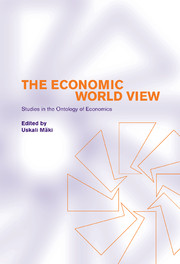Book contents
- Frontmatter
- Contents
- Notes on the contributors
- Preface
- I The what, why, and how of economic ontology
- II Rationality and homo economicus
- Part III Micro, macro, and markets
- 9 Essences and markets
- 10 The metaphysics of microeconomics
- 11 Ontological commitments of evolutionary economics
- 12 Is macroeconomics for real?
- 13 The possibility of economic objectivity
- Part IV The world of economic causes
- Part V Methodological implications of economic ontology
- Name index
- Subject index
11 - Ontological commitments of evolutionary economics
Published online by Cambridge University Press: 04 August 2010
- Frontmatter
- Contents
- Notes on the contributors
- Preface
- I The what, why, and how of economic ontology
- II Rationality and homo economicus
- Part III Micro, macro, and markets
- 9 Essences and markets
- 10 The metaphysics of microeconomics
- 11 Ontological commitments of evolutionary economics
- 12 Is macroeconomics for real?
- 13 The possibility of economic objectivity
- Part IV The world of economic causes
- Part V Methodological implications of economic ontology
- Name index
- Subject index
Summary
Introduction
Any attempt at offering a discussion of `an ontology of evolutionary economics' is immediately fraught with difficulties. First, evolutionary economics is proliferating so rapidly that any attempt runs the danger of being obsolete before it is published (see, for example, Hodgson 1997). Second, at present evolutionary economics does not constitute an unequivocally defined school or movement. It rather covers many different approaches and standpoints (see, for example, Langlois and Everett 1994 and Nelson 1995). And, finally, even if we confine our attention to a few clearly circumscribed branches within evolutionary economics and forget about the rest, it is not at all clear what exactly we are looking for if we want to focus on their ontologies (or ontological commitments). Given these difficulties some preliminary remarks are in order.
‘Evolutionary economics' in this paper comprises two distinct branches: Nelson and Winter's evolutionary theory and evolutionary game theory. This already involves a choice that will affront many self-confessed proponents of evolutionary economics. To many Nelson and Winter's evolutionary theory (let alone evolutionary game theory) is already too close to neoclassical economics to be called ‘evolutionary economics' at all. Such proponents of evolutionary economics typically plea for a radical break with equilibrium theorizing and stress phenomena like nonlinear and self-organizing systems (see, for example, Day and Chen 1993) and endogenously created novelty and – consequently – the open-endedness of economic evolutionary processes (see, for example, Saviotti and Metcalfe 1991).
- Type
- Chapter
- Information
- The Economic World ViewStudies in the Ontology of Economics, pp. 189 - 224Publisher: Cambridge University PressPrint publication year: 2001
- 4
- Cited by



